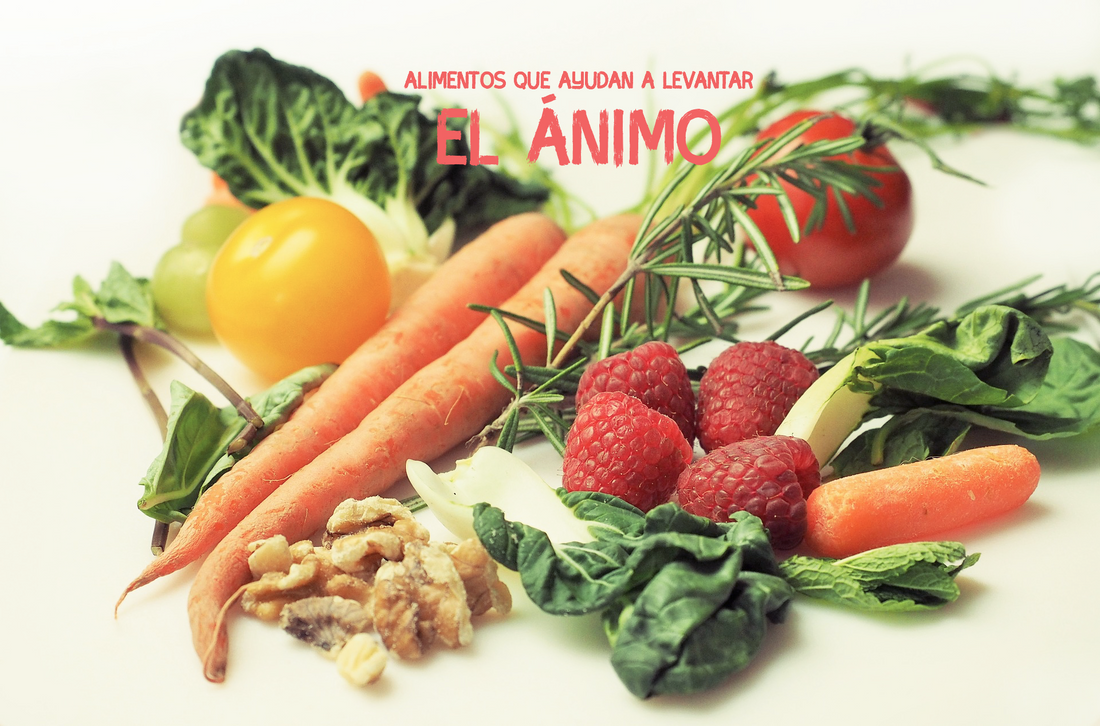
Foods that help lift your spirits when you are sad or depressed
Share

Although December is a time when so many events, such as business meetings, friends and family gatherings, leave little room for sadness, for many people this is not the case.
This is often a time to sum up and reflect on the year that has passed. Some of us have lost loved ones or do not have the opportunity to spend this time with family and friends, plus other circumstances that can lead us to a much less than festive mood.
In some parts of the world in the northern hemisphere, this is the time when a disorder called seasonal depression appears, caused, among other things, by the lack of sunlight these places receive and whose symptoms can be quite overwhelming and unexplained. But let's go a little deeper and see that there are solutions for these conditions.
True emotions vs false moods

Some negative feelings are unavoidable and even beneficial, and are what we would call “true emotions.” These honest responses to the difficulties we face in our lives can be difficult to cope with, sometimes overwhelming, depending on the moment we are going through. But at the same time, they are vital to our spiritual evolution. Grief, for example, helps us to overcome our losses, true fear warns us of danger, true anger defends us from abuse, and true shame teaches us to change and grow. These true emotions eventually pass or subside naturally, even if they have been repressed or redirected, and can be alleviated with counseling.
But when we suffer for no justified reason, when the pain of a broken heart does not heal like a broken bone; when rest, prayer, meditation or psychotherapy do not do their job, we must begin to wonder if there is an emotional impostor, a senseless biochemical error and is, perhaps, the presence of a false state of mind.
If it is honestly the latter, believe me, you can eliminate these fraudulent feelings of depression, anxiety, sadness and irritability that are interfering with your natural ability to enjoy life.
The main cause of your false mood
According to Dr. Julia Ross in her text The Mood Cure , the thing responsible for most of your feelings, both true and false, is your brain. Along with the heart and colon, which are areas of your body that act as the brain, your brain transmits your feelings through four highly specialized and potent types of mood molecules. If you have enough of all four, this keeps you as happy as you can be, given the circumstances you are in.
But if your brain has low levels of these mood neurotransmitters, whether due to a minor genetic fault, or because you've used them up dealing with stress, or because you're not eating a balanced diet, your brain stops producing normal emotions consistently and starts producing misleading responses.
Neuroscience, the field of science that studies the workings and effects of the brain, has identified most of these false moods and their consequences after 30 exhaustive years of research. Pharmaceutical laboratories have taken advantage of this information to create products and give your emotional system a quick fix. But it is not the same as making a permanent repair.
Fortunately, the emotional calibration we need is achievable and accessible!
There is a lot you can do to combat these feelings that are there and we have to deal with them. It is important to sleep well, get out of the house in order to practice some physical activity, but in addition to that, today I present to you some foods that can help you increase your motivation and lift your spirits in a very short time.
The True and False Emotional Chemistry of Your Brain
- If you have high levels of serotonin : you are a positive, self-confident, flexible and easy-going person.
If your serotonin levels are very low: you tend to be negative, obsessive, worried, irritable and have difficulty sleeping.
- If you have high levels of catecholamines (there are 3 main ones: dopamine, norepinephrine and adrenaline): you have a lot of energy, you are optimistic, happy and alert.
If your catecholamine levels are very low: you are a lethargic person, without energy.
- If you have elevated levels of GABA (gamma-aminobutyric acid): you are a relaxed and stress-free person.
If there is a gap in your GABA content: you will feel stressed, nervous, overwhelmed.
- If you have elevated levels of endorphins : you have a feeling of fullness, comfort, pleasure and sometimes even euphoria.
If your endorphin levels are low, you may be one of those people who cry a lot and are overly sensitive to what you see and hear.
Foods for good spirits
It is important to note that sometimes our reserves of the neurotransmitters mentioned above are so low or empty that it is advisable to take a supplement to be able to replenish those reserves with the minimum, so that the following foods can fulfill their purpose.
Food for good spirits number 1: protein

Where can I find protein sources for a plant-based diet?
We have already talked in previous articles about good vegetable sources of protein and how to solve this dilemma that a diet without animal protein has posed to us. ( source ) and ( source )
Don't forget to include at least 3 of these foods in your daily diet: hemp seeds, chia seeds, spirulina, moringa, flax seeds, fermented soy, almonds, Brazil nuts, pumpkin seeds.
Brazil nuts are also packed with selenium, which has a direct effect on mood. They are so rich in this mineral that just 2 a day increases the amount of selenium circulating in the body. They also contain several B vitamins that help stabilize mood ( study ). 6 nuts (4.1 grams of protein) a day are enough to provide the amount of selenium necessary for the body.
Pumpkin seeds, on the other hand, contain magnesium. Just ¼ cup contains 9 grams of protein and up to 50% of the daily recommendation, promoting relaxation, better sleep quality and anxiety relief, so take advantage of adding it to your meals.
Food for good spirits number 2: healthy fats

Omega-3 fatty acids: flaxseed and chia. Plus an EPA/DHA supplement
Virgin coconut oil
Avocado
Olive oil
Black or green olives
There are many preparations you can make with these ingredients, even if you don't feel like cooking or preparing food, half an avocado (rich in vitamin B6, E, C and fiber. They also contain vitamin B5 that helps synthesize neurotransmitters and provides support to the adrenal glands) with or in a simple salad or accompanying a soup, can make you feel satisfied.
Flaxseeds contain omega-3 fatty acids that help maintain healthy endorphin levels. Two tablespoons a day contain 133% of the recommended daily allowance of omega-3s. Try grinding the seeds yourself before consuming them to reap the full nutritional benefits.
They can also be used as an egg substitute in recipes that require that texture (1 tablespoon of ground flax seeds + 3 tablespoons of water = 1 egg).
Include them in your smoothies, soups, salads and vinaigrettes.
Food for good spirits number 3: vegetables

Vegetables are essential companions to proteins and healthy fats to provide the brain with all the nutrients it needs to balance our mood.
Include tomatoes, Brussels sprouts, broccoli, as well as green leafy vegetables in your meals.
Spinach, for example, is high in iron, which helps keep our red blood cells oxygenated and our body energized. It is rich in omega-3 fatty acids, potassium, and magnesium, which help regulate sleep-wake cycles. Spinach also contains vitamin C, which helps fight fatigue and depression. Since its flavor is not very strong, you can add it to almost any recipe, from smoothies to juices, soups, salads, and hot dishes.
Foods that can be added to this guide

Dark chocolate (at least 70% cocoa content) and unsweetened chocolate contains polyphenols that help balance mood and relieve anxiety and depression ( study ).

Lentils have a high folic acid content that regulates the production of serotonin, very beneficial for alleviating the effects of seasonal depression. It allows the body to generate new cells, its complex carbohydrate content stimulates the production of tryptophan which in turn stimulates the production of serotonin.
So even if you're on a low-carb diet, give your body an invigorating boost with some lentils.

Quinoa is another whole grain with complex carbohydrates that also stimulate serotonin production. Serotonin is a neurotransmitter that helps you maintain a stable mood, improves memory and enhances libido. It is not for eating every day, but it is better than consuming grains like wheat, barley, oats, millet and rye.
Ghee . Normally, ghee would be excluded from a plant-based diet because it comes from cow's milk, but because it is lactose-free and has a high vitamin D content, it helps improve intestinal health and mood.
The Guide to Foods for Good Mood
- Protein
50-60 grams per day of nuts, seeds, legumes.
- Low carb vegetables
4-5 cups a day (raw or cooked) of zucchini, asparagus, broccoli, cabbage and the like.
1 cup = 3 celery stalks, 2 medium tomatoes, or 2 cups of green leafy vegetables such as spinach, lettuce.
- Healthy fat
Please use extra virgin olive oil, coconut oil, ghee (clarified butter), avocados and coconut milk for your salads.
- Liquids
At least 10 glasses of filtered water, plus aromatic or vegetable juices and/or red fruits.
- Carbohydrates
The following carbohydrates may be added depending on metabolism, weight and energy requirements. Likewise, if you are vegan, you may require more legumes, nuts and seeds to complete your body's requirement.
If you eliminate high-carb foods, be sure to compensate by consuming more protein, fat, and low-carb vegetables.
- Fruits: 2-4 servings per day of 1 apple or 1 peach, or a cup of berries.
- High-carbohydrate vegetables: carrots, beets, sweet potatoes, pumpkin.
- Legumes: lentils, beans, mung beans
- Whole grains: quinoa, corn, amaranth.
Supplements
Note: Before using supplements, please consult with your trusted physician to confirm that you may have these deficiencies.
To increase serotonin reserves: 5-HTP; L-tryptophan; St. John's wort; Melatonin for sleep.
Catecholamine deficiency (can be confused with an imbalance of thyroid hormones): tyrosine; omega-3 fish oil; Picogenol present in grape seed extracts.
To balance gamma-aminobutyric acid GABA , it is recommended to start with small doses of the GABA supplement and depending on the results, there are two other amino acids that can complement it: Taurine and lysine.
There is also a homeopathic mixture called Max Dream, which is useful for helping you fall asleep, or the floral essence Rescate, which helps you stay calm, even in very difficult situations.
As for balancing endorphins , there are supplements with the amino acids L-phenylalanine and D-phenylalanine. But again, discuss these conditions with your doctor to supplement appropriately.
